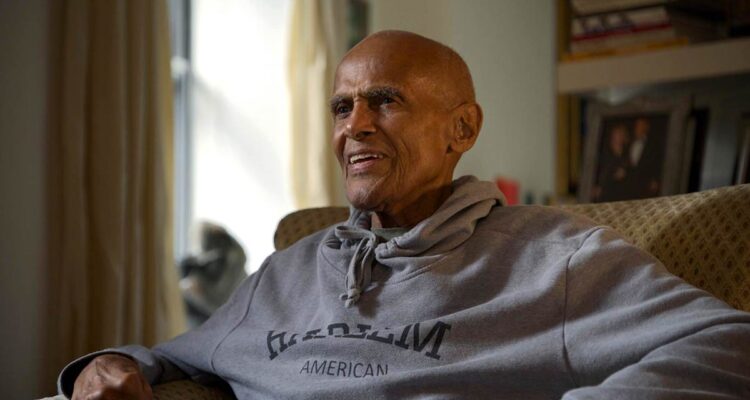“Fuck you. I’m going to Paris,” the unflinching words spoken by screen legend Harry Belafonte, is just one of the many telling soundbites in Elvis Mitchell’s directorial debut “Is That Black Enough For You?!?” Mitchell, a film critic by trade, is entering the filmmaking space to bring a fascinating documentary that blends his personal filmgoing memories with the game-changing history of Blaxploitation cinema for an astute survey of the latter’s form and function. It’s a film rendered with piercing intimacy, which manages to never give ground while providing a nearly comprehensive historical timeline of Black filmmaking.
And yet, “Is That Black Enough For You?!?” – produced by Steven Soderbergh and David Fincher – isn’t wholly myopic either. Because at every turn, Mitchell makes cogent connections: from the revolutionary gaze in these films to the ways they influenced their white counterparts as well. Mitchell’s film, partly by virtue of his curiosity, and the film’s non-linear editing, initially carries a freewheeling rhythm. He begins in the earliest days of Black folks in Hollywood by chronicling the hurtful Mammy and cowardly butler stereotypes that proliferated early cinema: At one point, Mitchell perceptively notes how, in the movies, eveningwear for white men meant a night on the town, while for Black men, a bow tie and coattails entailed servitude.
And as Mitchell progresses in this timeline toward the birth of Blaxploitation, he becomes prone to digressions. It’s worth noting that these detours are a casual feature rather than a breakable glitch. Because Mitchell narrates much of the documentary, the early, open maneuvering from one subject to the next, gives the documentary a conversational feel rather than a stuffy academic lesson (which isn’t to say it’s any less rigorous).
Mitchell also assembles a relatable cadre of talking heads to recount their early moviegoing experiences. Whoopi Goldberg and Samuel L Jackson are especially hilarious, yet succinct in their sharp observations of Hollywood: The absence of Black people and the need to see any kind of representation on screen. Jackson, at one point, explains how, as a child, he thought “Our Gang” was surprisingly progressive for including a Black kid (Buckwheat) as a close friend with white kids.
Some other imperative talking heads include Charles Burnett, Suzanne De Passe, Billy Dee Williams, Laurence Fishburne, Margaret Avery, and Belafonte. Each provides unforgettable personal memories of watching and participating in the recounted movies. Belafonte, in particular, is bracingly candid and gives some of the film’s most memorable soundbites as he talks about why he left Hollywood rather than take demeaning roles. Mitchell sees Belafonte as the Muhammad Ali of his profession, a man who left at the peak of his powers for an ideal he believed in. It’s a clever throughline that makes you wish Mitchell’s next documentary, if he chooses to enter this arena again, would fully contextualize and play with. The only talking head that feels out of place is Zendaya. While it makes sense to include her, you do want someone with a younger perspective, especially someone who can be counted as a movie star, she provides a kind of thin substance that can only be defined as broad and not terribly incisive.
READ MORE: 2022 New York Film Festival Preview: 14 Must-See Movies
After the premiere of Reginald Hudlund’s “Sidney,” a documentary detailing the life and career of pioneering movie star Sidney Poitier, Mitchell’s film is the second recounting of Black 1970s cinema that conveniently glosses over Bill Cosby. It makes sense: Once you open up that Pandora’s box, it’s basically impossible to close. Still, at some point, as we’re building out the story of the historical record of Blaxploitation, we will have to cohere the awfulness of Cosby with the legitimate impact he made on Black cinema during the decade (to be totally fair, W. Kamau Bell’s docuseries “We Need To Talk About Cosby” does attempt to do exactly that). Still, that isn’t the documentary Mitchell is making.
These are minor quibbles because “Is That Black Enough You?!?” so totally thrums as an imperative guide through major figures and the stars that could’ve been, that it’s a wholly delightful watch. It’s wonderful, for instance, to see a tremendous actor like Rupert Crosse, cut down far too early in life, given a wide patch of praise for his unparalleled talent. The same can be said of Diana Sands. I even found myself scribbling down a few titles that were new to me. This documentary is engineered to ignite your curiosity for these critical works, and in that regard, it’s a major success.
Mitchell’s lyrical narration and his idiosyncratic reflections pay big dividends as the documentary wears on. He makes a brilliant connection between the opening of Gordon Parks’ “Shaft” and John Badham’s “Saturday Night Fever” and delves deep into the practice, started by Blaxploitation, of using soundtracks to promote a movie. For every moment, you ask – “But what about that person?” – Mitchell answers the call by not just checking a box, but by fluidly weaving these players and these movies into their larger cinematic fabric. And in the process, elevating Blaxploitation to its rightful cultural perch.
Mitchell’s “Is That Black Enough for You?!?” – whose title stems from Ossie Davis’ “Cotton Comes to Harlem” – is indeed very and proudly Black. Rather than outlining a mere monolithic presence, it displays the multifaceted distinctions of Blackness. We witness and appreciate these works with the same reverence that Mitchell espouses. “Is That Black Enough for You?!?” is indeed more than enough, and makes you hope Mitchell gives us plenty more documentaries to come (and soon). [A-]
“Is That Black Enough For You?!?” debuts on Netflix on November 11.

